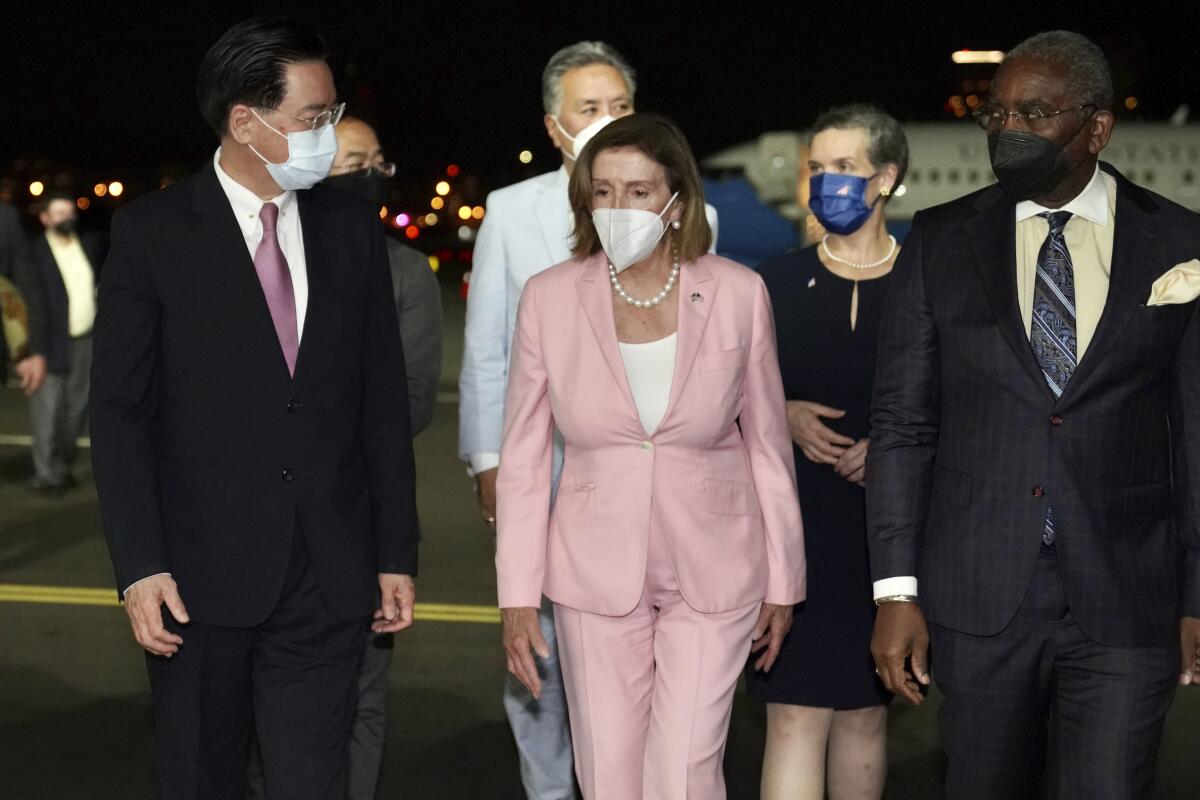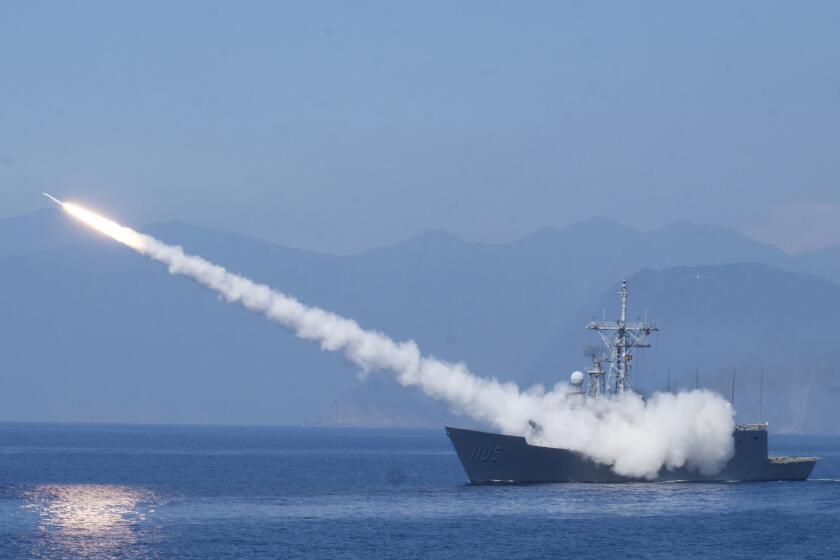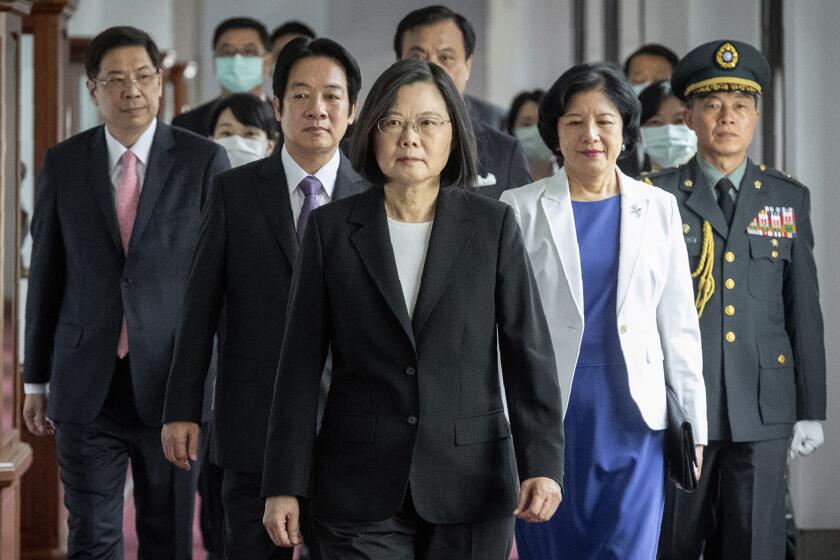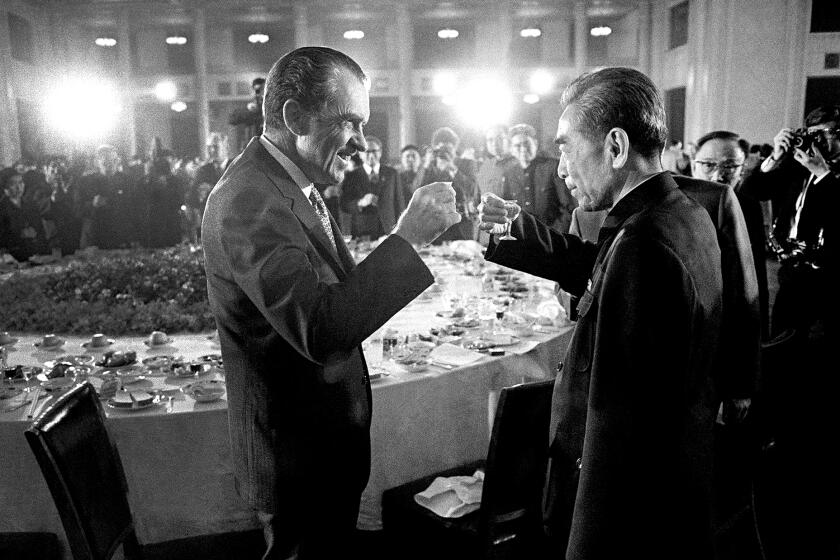Pelosi arrives in Taiwan, increasing tensions between the U.S. and China

- Share via
TAIPEI, Taiwan — House Speaker Nancy Pelosi arrived in Taiwan on Tuesday for an unannounced but widely anticipated and controversial visit sure to deepen U.S.-China tensions and fears of military conflict between the two superpowers.
Pelosi, an outspoken critic of Beijing, is the highest-ranking elected U.S. official to visit Taiwan in 25 years. Even before her arrival during an official tour of Asia, the prospect of a stop in Taiwan drew the ire of Beijing, which sees the trip as a challenge to its claim of sovereignty over the self-governed island.
“Our delegation’s visit to Taiwan honors America’s unwavering commitment to supporting Taiwan’s vibrant Democracy,” Pelosi tweeted within minutes of touching down at the airport in Taipei. The closely watched flight from Malaysia took a long route around the South China Sea and landed shortly after 10:40 p.m. Pelosi was greeted by Taiwanese Minister of Foreign Affairs Joseph Wu and other officials.
In a dig at China, she added that supporting Taiwan “is more important today than ever, as the world faces a choice between autocracy and democracy.” But she also insisted that her visit “in no way contradicts” the U.S. policy toward China and Taiwan that has held for decades.
Pelosi was scheduled to meet with Taiwan’s president, Tsai Ing-wen, Wednesday morning.
Chinese officials have been quick to threaten reprisal, with President Xi Jinping warning President Biden last week that “those who play with fire will perish by it.” The aggressive rhetoric has stoked concerns over military escalation, fueling a debate over the wisdom of Pelosi’s trip and the potential backlash to it.
After Pelosi landed in Taiwan, China’s Ministry of Defense condemned the visit and said it would launch a series of targeted military operations.
State media reported that the military’s Eastern Theater command began a series of naval and air exercises and long-range live-fire drills in the Taiwan Strait on Tuesday night, and that the army planned to conduct military drills from Thursday through Sunday all around the island, after Pelosi is scheduled to leave.
China’s Ministry of Foreign Affairs Tuesday accused the U.S. of emboldening Taiwan’s independence efforts and said it would have to bear the consequences of its actions.
The democratically ruled island of 23 million has become a central point of contention in the deteriorating U.S.-China relationship. With mistrust growing between the two countries, analysts said Pelosi’s visit could lead to miscommunication and a military clash that neither side wants.
“The risk of an unintended crisis as a result of large-scale military posturing by China is uncomfortably high,” said Amanda Hsiao, senior China analyst at the think tank International Crisis Group. “It’s very possible for policymakers on the two sides to radically misread each other’s intentions.”
Given the heightened tensions, the U.S., China and Taiwan will need to tread carefully to avoid aggravating the situation, Hsiao said.
China is warning it will respond forcefully if U.S. House Speaker Nancy Pelosi proceeds with a planned visit to Taiwan.
China’s global power and influence have grown exponentially since the last such visit by a U.S. official of Pelosi’s rank, when then-Speaker Newt Gingrich, a Republican, traveled to Taiwan in 1997 to meet with then-President Lee Teng-hui. Some experts in the U.S. warned that Pelosi’s trip would offer little material benefit but could prompt a saber-rattling response from Beijing that would mushroom into a larger crisis. Others, though, worried that a cancellation would be seen as bowing to Chinese pressure and could undermine faith in U.S. support for Taiwan.
While the Biden administration is reluctant to look soft on China, it also has little interest in antagonizing the country’s leadership, particularly with war raging between Russia and Ukraine. The U.S. has warned China against providing material support to Russia, and would be hard-pressed to confront challenges from both countries at once.
Prior to Pelosi’s trip, Biden said the Pentagon advised against it but was taking steps to ensure her safety. White House National Security Council spokesman John F. Kirby said the visit did not contravene long-standing U.S. policy and should not be a reason for China to increase military activity.
Analysts said that though Beijing is under pressure to follow through with its warnings, it wants to stop short of actions that could draw it into a war with the U.S., which is bound by federal law to ensure that Taiwan can defend itself. Biden has said the U.S. would intervene militarily if China attacked Taiwan, though the administration has walked back those comments. China’s countermeasures, which include missile tests, expanding military exercises and more aggressive air and sea excursions, are a step up from normal military activity around Taiwan and indicate a more provocative stance.
The suspect in the shooting at a Laguna Woods church is believed to have been driven in part by the political belief that Taiwan is a part of China.
More dire possibilities might include a naval blockade directed at the key southwestern port city of Kaohsiung, no-fly zones over the Taiwan Strait and military exercises that cut off Taiwan’s conduit to the outside world. Those scenarios would mark significant escalation and pose grave danger for the Taiwanese military, which would have to respond by scrambling warplanes and naval assets.
“The Chinese military will not target the U.S.,” said Yujen Kuo, director of the Institute for National Policy Research at National Sun Yat-sen University in Taiwan. “China will punish Taiwan.”
China also suspended food imports from more than 100 companies in Taiwan, local media here reported Tuesday. China has previously banned Taiwanese products such as pineapple and grouper, seen as an attempt to exert economic pressure on the island.
Breaking News
Get breaking news, investigations, analysis and more signature journalism from the Los Angeles Times in your inbox.
You may occasionally receive promotional content from the Los Angeles Times.
China has long considered Taiwan part of its territory, though the Communist Party has never ruled the island. After losing the Chinese civil war in 1949, the Nationalist Party fled to Taiwan with the goal of one day retaking the country. In 1979, Washington switched diplomatic relations to the Communist Party, and adopted a policy of acknowledging Beijing’s claim over Taiwan without endorsing it. Meanwhile, Taiwan transitioned into democratic rule, and increasingly its citizens view their cultural and political identity as separate from mainland China.
As Beijing has ramped up calls for unification and buzzed the island with record numbers of warplanes, the growing tensions have led some officials to warn that an attack is possible in the next few years.
Xi, who is expected to break Chinese political norms by securing a third five-year term as president this year, considers unification with Taiwan of utmost importance under his broader goal of “national rejuvenation.” The Chinese leader is juggling domestic challenges ahead of the anticipated term extension, including a property crisis and the economic impact of COVID-19 lockdowns. A weak response to Pelosi’s visit could undermine his leadership at a politically sensitive time.
How aggressively China chooses to push is entirely up to Xi, Kuo said. But if he “doesn’t react strongly to Pelosi’s visit, he will face tremendous challenges from other factions within the Communist Party.”
Russia’s invasion of Ukraine has raised awareness of the potential for conflict with mainland China, spurring initiatives to bolster defenses in the Taiwanese military and among civilians. However, many locals are skeptical that Pelosi’s visit will lead to a substantive change in China’s military approach toward Taiwan.
Despite pressure from Beijing, many Taiwanese citizens and lawmakers celebrated Pelosi’s arrival as a sign of U.S. support and international recognition. On Tuesday evening, the Taipei 101 skyscraper was lighted with messages of thanks and gratitude to Pelosi and the U.S.
While the Nationalist Party generally favors closer ties with Beijing, the opposition party also said Tuesday that it welcomes Pelosi, along with other international visitors who promote liberal democratic values and free trade.
Nixon and Kissinger gave away more than they needed to in pursuit of China’s help ending the Vietnam War.
“The visit should not be interpreted as a provocation but rather as support for maintaining the cross-strait status quo,” said Wen Lii, director of the Matsu Islands chapter of Taiwan’s ruling Democratic Progressive Party. “I think it’s important for Taiwan to continue to receive public gestures of support from fellow democracies.”
Yang reported from Taipei and Pierson from Singapore.
More to Read
Sign up for Essential California
The most important California stories and recommendations in your inbox every morning.
You may occasionally receive promotional content from the Los Angeles Times.















